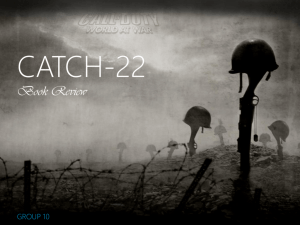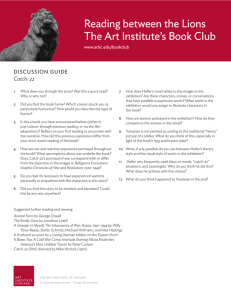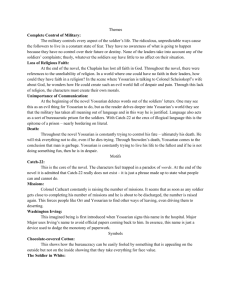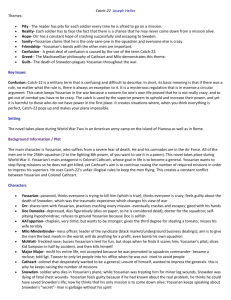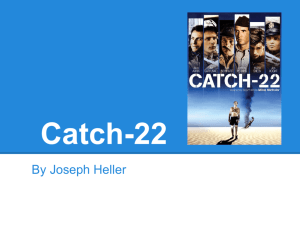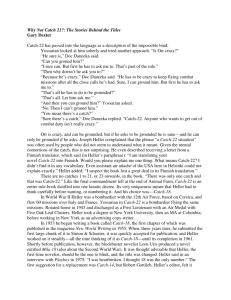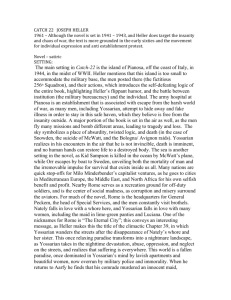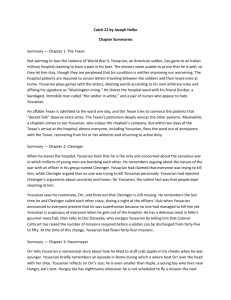CATCH 22 JOSEPH HELLER
advertisement
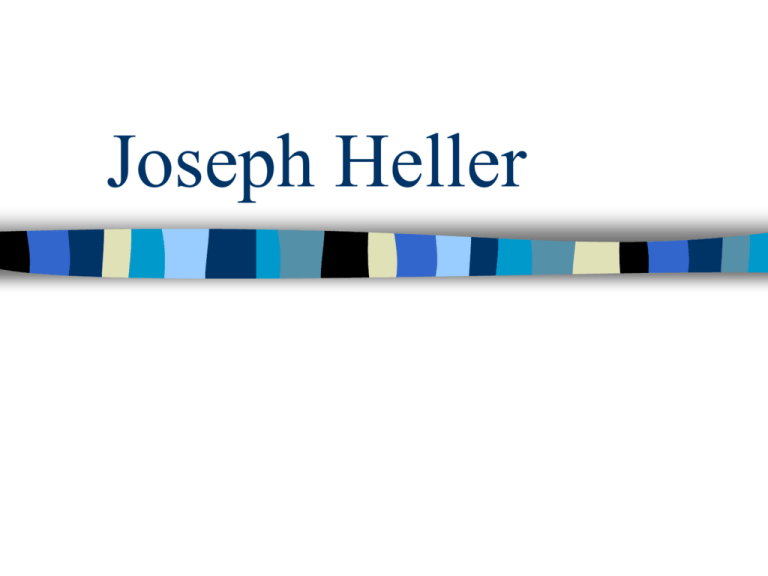
Joseph Heller JOSEPH HELLER (1923-1999) ABOUT THE AUTHOR Joseph Heller war born in Brooklyn, New York, as the son of poor Jewish parents. After graduating High School in 1941, Heller joined the Twelfth Air Force where he flew 60 combat missions as a B-25 bombardier. ABOUT THE AUTHOR In the early 1950s he started working on Catch-22. The novel went largely unnoticed until 1962, when its English publication received critical praise CATCH 22 A CLASSIC One of the most influential book in modern literature . Huge impact on popular culture and literary circles A CLASSIC It introduced the post war world to the concept of ‘Black Humor’ This book also gives us the first true ‘anti-hero.’ THE SETTING World War 2. Americans in Italy wait every day for the next mission. Some people are just crazy about it, others detest the entire business. And for those who detest it there are only two ways of getting rid of it: a) you could get killed, or b) you could get grounded. So, the system works in a way that makes the in-chargeof-grounding-people people ground every man who's physically damaged or mentally crazy. Therefore, in order to be grounded, all you have to do is to be, or pretend to be, crazy. There is only one catch. Catch22. THE CHARACTERS Yossarian Colonel Cathcart Orr Dunbar Nately Chaplain A. T. Tappman Milo Minderbinder Major Major Major Major Snowden Yossarian: The main character of the novel. Yossarian is a paranoid bombardier who thinks everyone is trying to kill him. He avoids flying combat missions by all means possible: by moving the bomb line on the map of Italy preceding the Bologna mission, by poisoning the squadron’s potatoes, by dismantling his intercom and ordering his plane to turn back, and by feigning a liver condition to pass the time safely in the hospital. Colonel Cathcart : A conceited and dejected colonel who constantly tries to garner attention and desperately wants to be a general. Cathcart is the main antagonist of the novel because he volunteers his men for dangerous assignments and constantly raises the number of missions in a tour of duty to break records. He carries a cigarette holder to make him look sophisticated and is obsessed with getting his picture in The Saturday Evening Post. Cathcart is plagued by a persecution complex and constantly tallies up pros and cons as 'feathers in his cap' and 'black eyes.' Orr: Yossarian’s warm-hearted roommate, whose inventions (like a wood-burning stove) make their tent the most luxurious in the squadron. The unlucky, buck-toothed freak crash-lands on every mission. He asks Yossarian to fly with him, but Yossarian refuses. Everyone things Orr is simple-minded because he stuffs his fat cheeks with apples. His pretend ignorance is actually a cover and the frequent crashes are really practice for his escape to Sweden. He wanted Yossarian to join him, but his roommate never took the hint. Dunbar: Yossarian’s mischievous friend who cultivates boredom to increase his life-span. Dunbar stirs up trouble, fondling nurses with Yossarian and inciting a riot in the hospital over the soldier in white. Officials cause Dunbar to mysteriously 'disappear' before Yossarian can warn him of the impending trouble. Nately: A rich, gentle, polite, good looking young man who looks out for Yossarian. Patriotic and idealistic, Nately finishes his missions but signs on for more because he is desperate to stay near his beloved girl. He wants to marry her, even though his wealthy father will disapprove. Nately is tragically killed on one of these extra missions, and his death deeply affects the chaplain and Yossarian. Chaplain A. T. Tappman :An Anabaptist minister who is shy and self-conscious. He lives on the woodsy outskirts of camp and is pushed around by officials and his own assistant. Homesick and submissive, he longs for his wife and is grateful for Yossarian’s friendship. He often pleads with higher ranking officials on Yossarian’s behalf to stop raising the number of missions and to send the men home. Milo Minderbinder: The mess hall officer who creates an international trade syndicate in which everyone has a share. The entrepreneur is hugely successful and is elected to various public offices in countries along his trade route. Milo conspires with the Germans to bomb his own unit for profit and sells mission plans to the enemy. M & M Enterprises nearly collapses when Milo purchases a whole crop of Egyptian cotton. He tries to feed the cotton to troops in the mess halls by covering it with chocolate. Milo rationalizes everything by profit potential and convinces the army to support him because the syndicate is owned in part by everyone. Major Major : A reclusive Henry Fonda look-alike who was promoted to the rank of major by an IBM computer glitch. He jumps out of his window to avoid visitors and spends the better part of each day forging Washington Irving’s name to official documents Snowden: A radio-gunner who is killed during the Avignon mission. His guts spilled onto Yossarian in the back of the plane while he bled and froze to death. Snowden’s gory death haunts Yossarian. The chaplain conducts Snowden’s funeral and Yossarian walks around naked for a while, refusing to wear the uniform once soaked in Snowden’s blood. THE CATCH What CATCH-22 really is, is the evil circles that society frequently gets us into - in this book it takes shape in form of a non-non-mission-flying kind of evil circle. In fact, everybody who do fly the missions are considered crazy, and all they have to do to be grounded is ask for it. But, and here CATCH-22 enters the picture, everybody who do not want to fly the missions and for that reason asks to be grounded, are no longer considered crazy, and must therefore continue to fly the missions. THE CATCH CATCH-22 is a military term that is confusing and difficult to describe. In short, its basic meaning is that if there was a rule, no matter what the rule is, there is always an exception to it. It is a mysterious regulation that is in essence a circular argument. This catch keeps Yossarian in the war because a concern for one's own life proved that he is not really crazy, and to get out of combat you have to be crazy. The catch is used by the superior powers to uphold and increase their power, and yet it is harmful to those who do not have power in the first place. It creates situations where, when you think everything is perfect, CATCH-22 pops up and makes your plans impossible LITERARY SIGNATURE Heller does an excellent job of creating a dismal, war torn environment. One of the features of expressionist writing is its concentration on the emotional. And Heller brings out the very emotional side of war. He has certain scenes (such as the one with the Snowdon, a new recruit who dies in Yossarian’s arms in the back of a plane) that continuously repeat throughout the novel. Each time it repeats, a little more detail is added. Each time a little more detail is added, the reader reacts differently. It is beautifully done. By playing with the reader's emotions and making the reader constantly reconsider their previous reactions, Heller paints a confusing tapestry for his setting and plot. Departing from pure realism, he aimed for a book that would make people laugh, and then look back in horror at what had amused them REACTIONS Catch-22 aroused mixed reactions when it was published in 1961. John Pine of Library Journal, for example, recommended the "tedious" book only to libraries with large fiction collections. Novelist Nelson Algren, on the other hand, wrote that it was "the best American novel that has come out of anywhere in years." REACTIONS In England, Catch-22 hit the best-seller list the first week after being published in 1962. Sales rose in the United States in response. By the mid-1960s, Newsweek magazine was reporting "The Heller Cult," and college students were wearing Army field jackets with Yossarian name tags. Students related the novel not so much to World War II or the Korean Conflict as to the Vietnam War then beginning to escalate. REACTIONS Seeing the war as profitable only to the industrial and military "Establishment," they opposed American involvement in Vietnam and adopted bumper stickers reading "Better Yossarian than Rotarian” (a club for "Establishment" businessmen). CONCLUSION There is a line in the novel which goes as-"All over the world, boys on every side of the bomb line were laying down their lives for what they had been told was their country, and no one seemed to mind, least of all the boys who were laying down their young lives. There was no end in sight.“ CONCLUSION This is the essence of the whole book, despite it’s humor and wisecracks it remains a book that questions the concepts of martyrdom and patriotism. The book is brutal and unrelenting in nature and would not be forgotten by those who can take it.
